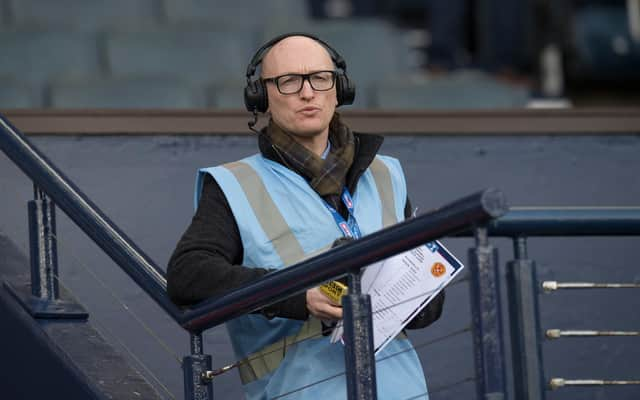A merciful end to tedious saga of Rangers and BBC Hundred Year War


For long and weary this had become akin to The Hundred Years War. In as much as, like the English-French late Middle Ages strife, its interminable nature had led to sight being lost of what had caused the darn thing to kick off in the first place. In this sense, the climbdown tone of the BBC’s statement that announced it will resume full coverage of Rangers games in the coming season seemed odd. As did the Ibrox club referencing an apology made by Michael Stewart in May for comments he made two years ago about then Rangers head of communications, James Traynor. Neither seemed entirely germane to what, in August 2015, led the BBC to stop sending representatives to Rangers games at Ibrox.
They have not done so since as a result of decision then to revoke BBC reporter Chris McLaughlin’s Ibrox media privileges over an article he filed on July 25 that year. The offending online piece, under the headline Arrests made at Hibernian v Rangers Challenge Cup match, stated that the Ibrox club “could be in trouble with the Scottish Professional Football League due to the behaviour of some of the club's fans during their win over Hibs…[with] three arrests were made after sectarian singing during Saturday's Scottish Challenge Cup tie at Easter Road Stadium.”
Advertisement
Hide AdAdvertisement
Hide AdIn their now smoothing over of the fall-out with Rangers that this provoked, the BBC sheepishly talked of recognising “the club has genuine concerns about the accuracy and balance of some coverage. The BBC acknowledges that there have been occasions when parts of the coverage of Rangers FC have not met its editorial standards. It has apologised for those instances and is happy to repeat those apologies now.”
Yet, the corporation supported McLaughlin - rightly – through refusing to cover Rangers home games while he wasn’t welcome because there was nothing in his original report seven years ago that was inaccurate. He merely referenced a police report that stated three fans had been arrested for sectarian singing. Even at the time, Rangers didn’t take real issue with this central crux. In then explaining the club’s ban for McLaughlin - a “particular reporter, we believe, [with whom] there has been a consistent failure to obtain a balanced view” - a spokesman said it was initiated because, after “police [were] praising both sets of fans {and] he led on the fact Rangers could be in trouble because two people were arrested for alleged sectarian chants.”
Owing to this genesis, the Ibrox club’s intransigence over McLaughlin has always seemed overblown, and unnecessary. It would appear offering some honeyed words has been considered by the BBC an acceptable olive branch to allow for a reset in their relationship with a major stakeholder in the game. And following a period when Rangers appeared intent on settling scores, the grasping of this suggests a willingness on the club’s part to settle down when it comes to normalising media relations. No-one should bother wasting any more energy over the specifics at play in bringing to an end a tedious saga.
A message from the Editor:
Thank you for reading this article. We're more reliant on your support than ever as the shift in consumer habits brought about by coronavirus impacts our advertisers. If you haven't already, please consider supporting our trusted, fact-checked journalism by taking out a digital subscription. www.scotsman.com/subscriptions
Comments
Want to join the conversation? Please or to comment on this article.